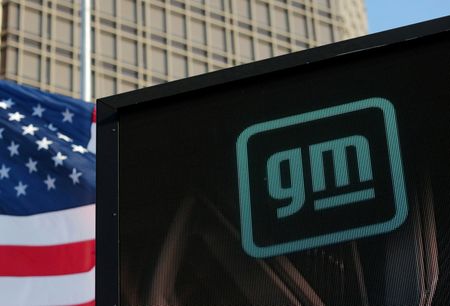By Joseph White and Paul Lienert
DETROIT (Reuters) -General Motors is wrestling with costs and struggling to build more electric vehicles, as it reported Tuesday that adjusted pre-tax profit and margins in its key North American market fell from the first quarter, despite a jump in revenue and per-vehicle transaction prices.
Shares were down 4.4% at $37.58 in mid-day trading.
The automaker said it plans to invest less in new products and cut operating costs by an additional $1 billion through the end of next year, and lifted its full-year profit guidance.
Chief Executive Mary Barra, in a call with analysts, said GM has reversed plans to kill its least expensive EV, the aging Chevrolet Bolt, at the end of this year. Instead, the company now expects to introduce an updated Bolt with a newer Ultium battery pack, but did not disclose details about cost, timing or plant location.
“A new Bolt should cost the same or less to produce than the outgoing model” if it shifts to a dedicated EV platform and next-generation batteries, said Sam Fiorani, head of global forecasting at AutoForecast Solutions.
Barra said battery production at the Ultium joint venture plant in Lordstown, Ohio, has been hampered because “our automation equipment supplier is struggling with delivery issues.” The situation should be resolved by year-end, Barra said. GM in the meantime is building battery modules by hand on manual assembly lines, she said.
GM said adjusted pre-tax profit and margins in its key North American market fell from the first quarter, despite a jump in revenue and per-vehicle transaction prices. Second-quarter results included a $792 million charge related to new agreements with EV supplier partners LG Electronics and LG Energy Solution.
On a year-to-year basis, GM said net income for the second quarter rose by nearly 52% to $2.6 billion, as revenue grew 25% from the same period in 2022 when production was hobbled by semiconductor shortages.
GM said it now expects full-year net income of $9.3 billion to $10.7 billion, up from a previous forecast of $8.4 billion to $9.9 billion. On a per-share basis, GM is forecasting net income of $7.15 to $8.15 for the year, up from a range of $6.35 to $7.35.
MORE BULLISH OUTLOOK
The new outlook does not factor in the potential costs of a strike by the United Auto Workers union should it fail to reach a new contract with GM by the Sept. 14 deadline.
The UAW focused on GM’s robust revenues and profits, mostly earned from union-made trucks, and a statement that called on GM to offer more in contract negotiations now under way.
“Auto workers and our communities have yet to be made whole for the sacrifices we’ve made since the Great Recession,” UAW President Shawn Fain said.
GM’s more bullish outlook comes after six months of stronger demand and richer pricing than expected earlier this year, Chief Financial Officer Paul Jacobson said during a media conference call.
But the decision to cut new product investment and operating costs comes as the automaker’s profit margins are under pressure. GM’s pre-tax profit margin for the first six months of the year fell to 8.3% of revenue, down from 8.9% a year ago.
GM now plans to spend $11 billion to $12 billion on capital investments this year, down from an earlier plan to spend $11 billion to $13 billion.
“There’s a lot of focus on winning with simplicity,” Jacobson said.
Barra said GM can cut capital spending by simplifying its product line, reducing the number of different combinations of colors and features offered. GM’s goal is to cut the number of feature and color trim combinations by half, Barra said.
In contrast to Tesla CEO Elon Musk’s strategy of cutting prices to accelerate demand, GM pushed average transaction prices in North America up by $1,600 to about $52,000 in the latest quarter, Jacobson said.
“We’re focused on profitability. Our recent results demonstrate that we’re not sacrificing margin for volume,” he said.
Barra, in a letter to shareholders, said the automaker is aiming to build “roughly 100,000 EVs in the second half of this year and we’ll grow from there.” In the first half, GM built about 50,000 EVs, most of them the older Bolt model, which is priced from $27,495.
GM’s earnings statement reiterated a previous target of building 400,000 EVs from 2022 through the first half of 2024, and projected EV revenue of $50 billion in 2025, with pre-tax profit in the low to mid single digits.
A Reuters analysis in May noted that a slow ramp-up of GM battery plants in Ohio, Tennessee and Michigan could limit the automaker’s annual EV production to less than 600,000 at mid-decade, even as GM aims to increase capacity to 1 million by 2025.
In a note to investors, CFRA analyst Garrett Nelson said he remains “cautious due to the near-term earnings drag from GM’s EV transition and its ability to execute an aggressive production ramp, as well as ultimate demand for its EV models.”
(Reporting by Joseph White and Paul Lienert in DetroitAdditional reporting by Ben Klayman in DetroitEditing by Matthew Lewis, Louise Heavens and Nick Zieminski)

